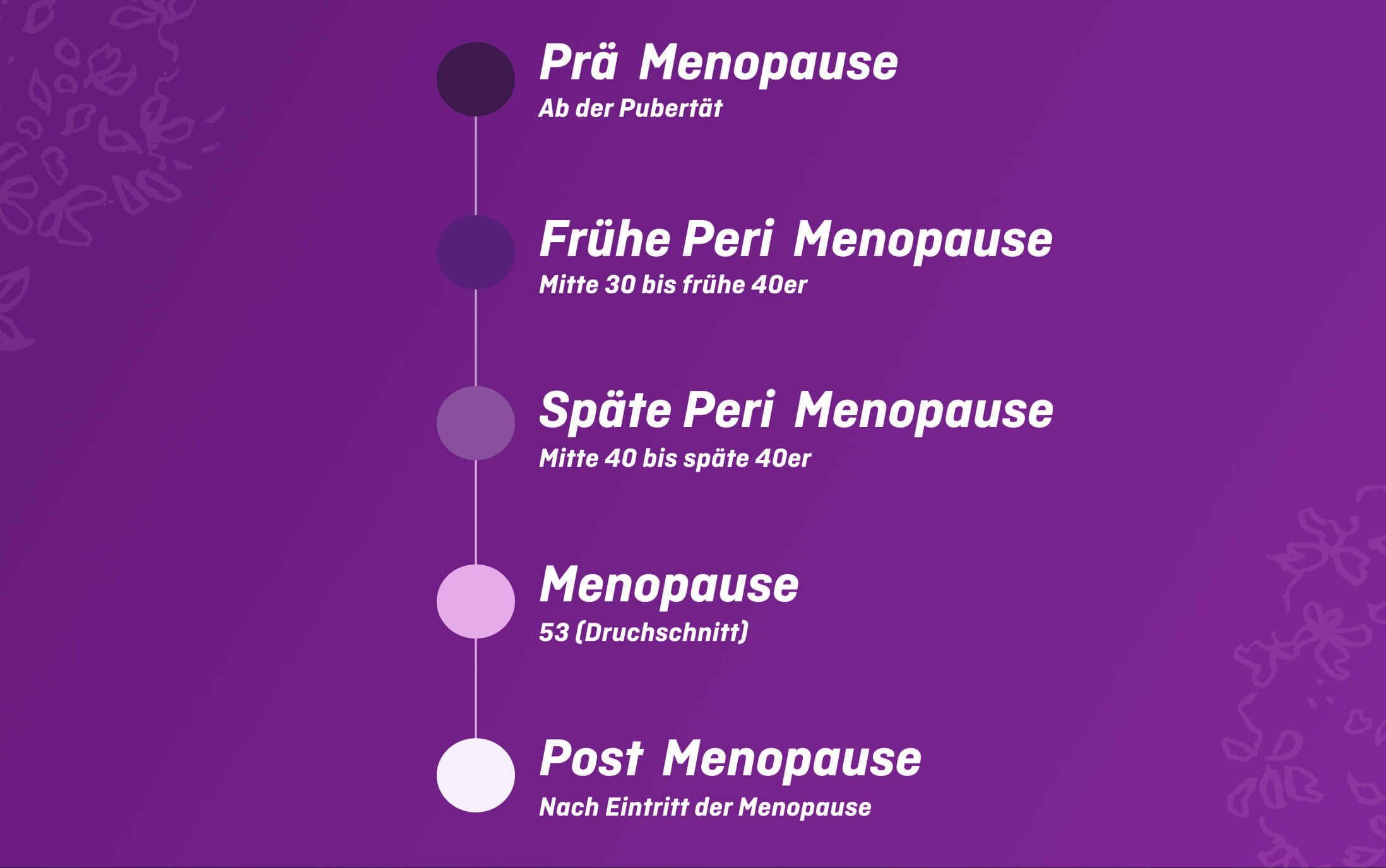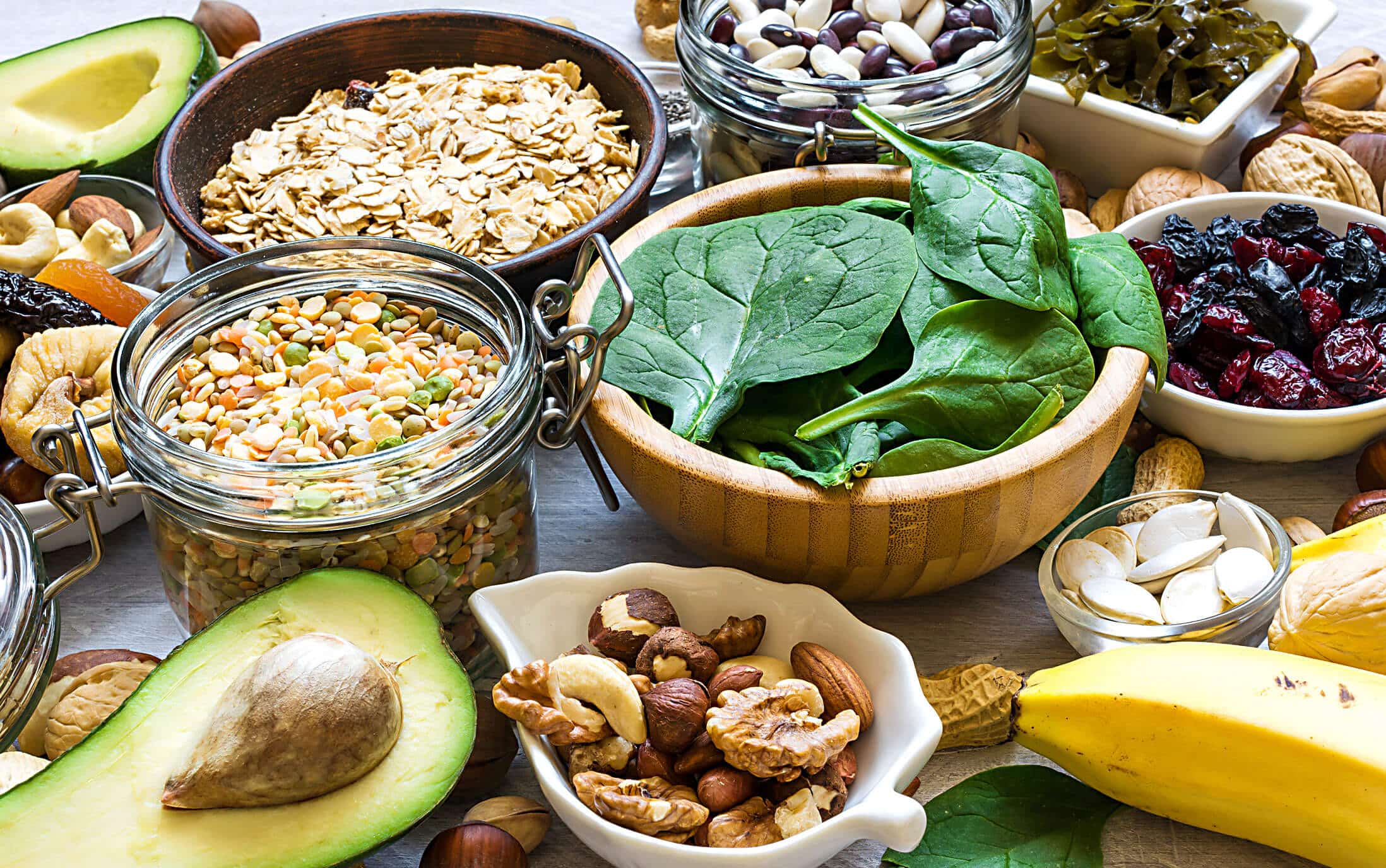Headaches during the menopause
Stabbing, pressing, burning, hammering or pulling, on one side or both, sudden or continuous. More than 200 different indications of headaches are known and more than half of Germans experience headaches sometimes or often, and during the menopause, as many as two in three women. Read more in this article to find out what headaches are, why they can occur during the menopause and what you can do about them.
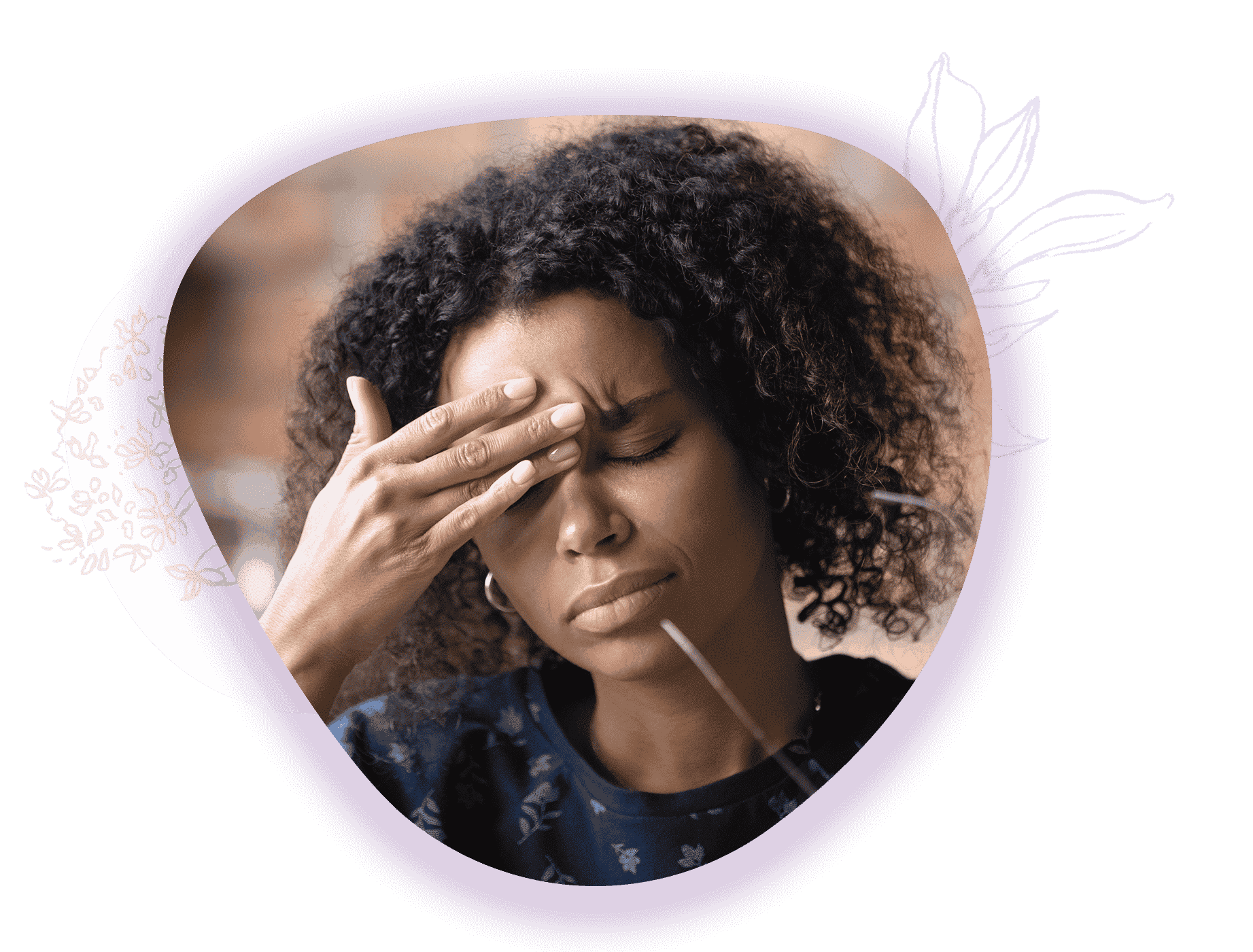
Headaches during the menopause: Signs and symptoms
Headaches are considered a typical female symptom and in fact, women are more commonly affected by headaches than men. Migraines tend to dominate in women and with men, cluster headaches occur more frequently. One reason for this difference is the hormone fluctuations in women.
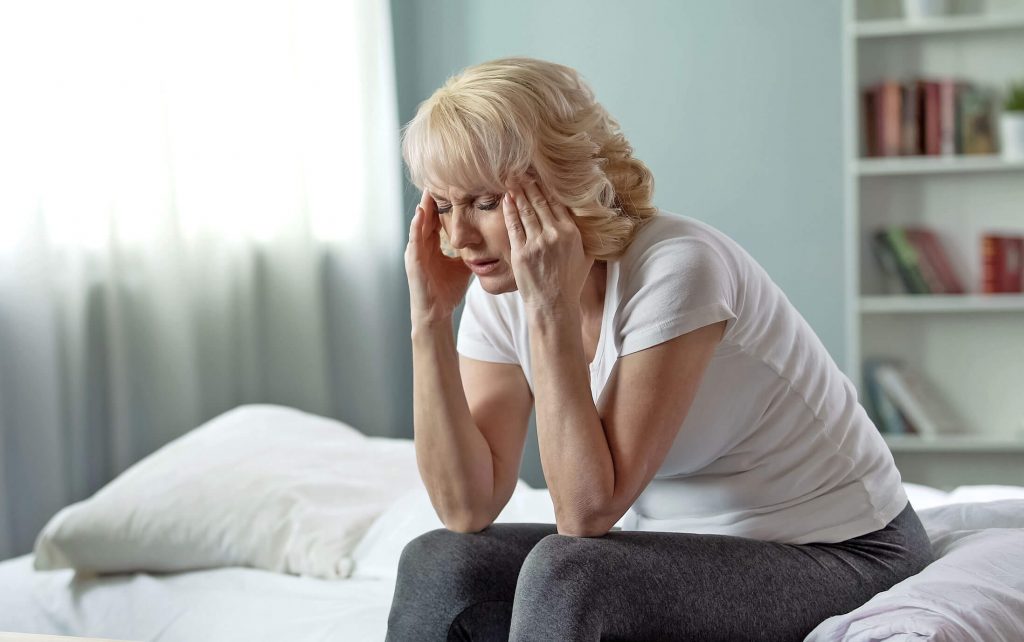
The three most important forms of headaches are tension headaches, which occur most often, as well as migraines and cluster headaches.
These three forms of headache are referred to as primary headaches, as they are not triggered by any illness. Meanwhile, secondary headaches have an organic cause such as high blood pressure, tension in the neck area or hormonal fluctuations, to name just a few examples.
While some women do not experience any headaches during the menopause, they are first triggered or even intensified in other women. Some women develop a severe, and above all, painful migraine during the menopause, which can last all day. Intense noises such as street noise and loud music become a form of torture, just as much as intense light sources and sunlight. In this situation, sometimes only peace and darkened rooms can help.
Headaches can have different causes. Very often, headaches occur due to a lack of fluid intake. But a poor diet, stress, lack of sleep, overweight and depressions can also cause headaches. Extreme weather conditions, mental reasons, poor posture, excessive nicotine and alcohol consumption, environmental toxins and defective vision can also be triggers for headaches.
Types of headaches
Tension headaches: Dull, pressing pain usually on both sides, tendency towards moderate severity, improved by exercise
Migraine: A throbbing or pulsating pain on one side, often accompanied by nausea, sensitivity to noise and light, made worse by exercise
Cluster headaches: Piercing, stabbing pain on one side, high intensity, localised in the eye region, relieved by exercise
Headaches during the menopause – What you need to know
Headaches occur most frequently in menopausal women who have already suffered from headaches earlier on, such as during menstruation. There are also women that get headaches for the first time at the start of the menopause.
It is not conclusively clarified how headaches and the menopause are related. Scientists assume that pressure-based changes in the head are triggered by the hormonal fluctuations. Oestrogen has the property of expanding blood vessels; by contrast, progesterone constricts the blood vessels. As hormone levels fluctuate during the menopause, the blood vessels are constantly expanding and constricting. This constant and above all, fast change, leads to pressure changes in the head, resulting in sometimes severe headaches.
Headaches are a relatively common phenomenon during the menopause and occur in 70% of all menopausal women. They occur particularly during the premenopause and gradually wind down during the menopause.
The natural medicinal herb extract EstroG-100® alleviates numerous discomforts during the menopause and is highly effective with accompanying headaches. Clinical studies have shown a significant reduction in the occurrence of these menopausal symptoms of around 51%.

Current science
Women constantly report that an existing migraine gets worse during the menopause. These observations are supported by an investigation that was carried out at the University of Cinicinnati in the US state of Ohio. Data was analysed from 3,664 women who suffered from headaches before and during the menopause.
The result showed that women known to suffer from migraines have a 60% greater risk of having headaches during the perimenopause. This is the transition phase into the menopause, in which the menstrual cycles lose their regularity, resulting more often in hormonal fluctuations and hormonal changes.
The study also revealed that frequent migraine attacks during the menopause are not necessarily attributed to hormone changes. Later in life, joint and back pain or other complaints may occur. A related increased intake of pain medication may be the actual reason for the increase in headaches during the menopause.
Martin, V. et al. Results of the American Migraine Prevalence and Prevention Study. The Journal of Head and Face Pain. 2016. 56
Headaches during the menopause – Prevention and treatment
Headaches always have a cause, whether it be a weather change, lack of sleep, stress or drinking too little. For this reason, it may be sensible to research the causes and document any occurring headaches in a pain diary to recognise certain patterns, i.e. when you get headaches.
In general, you can prevent headaches during the menopause by breaking down stress and deliberately paying attention to phases of rest and recovery as well as sufficient exercise and a healthy diet. Remedies can be found in fresh air and exercise outdoors, drinking enough, that is, 2–3 litres of water or unsweetened tea and avoiding lack of sleep, which can also trigger headaches. A glass of valerian tea or a glass of milk with honey are rituals that make falling asleep easier.

What to watch out for particularly with migraines:
Avoid histamine and glutamine: The flavour enhancer glutamate and the histamine in your diet are known migraine triggers. Histamine-rich foods include: Hard cheese (such as parmesan), red wine and sparkling wine, chocolate (releases histamines). Glutamate-rich foods include: Restaurant food (known as Chinese restaurant syndrome), all kinds of ready meals, wheat products, soy products.
Raise your serotonin level: A migraine can go hand in hand with a lack of serotonin, which is why it is not wrong to pay attention to a diet that is rich in tryptophan, which the body needs to produce serotonin. Tryptophan-rich foods include: Dairy products, nuts & seeds, lentils & beans.
Watch out for inflammations: Migraine frequency can increase through inflammatory reactions in the body, meaning that foods that promote inflammation should be avoided.
Foods that promote inflammation include: Sugar and white flour products, meat and sausage products (mainly pork).
Foods that inhibit inflammation include: Linseed oil and walnut oil, nuts (mainly walnuts), berries (mainly blueberries), fatty fish (such as mackerel or salmon), broccoli.
Our tips for you:
You do not always have to reach for the painkillers to relieve headaches during the menopause. Instead, there are numerous household remedies that you can use to treat, relieve and in the best case, eliminate pain:
Peppermint oil: Peppermint oil is a well-tested alternative for headaches. It has been scientifically proven that it unfolds the same effect as painkillers. Handle peppermint oil sparingly and add two to three drops to the forehead and temples.
Black coffee with lemon juice: Black coffee with lemon juice is also an effective remedy against headaches. Vice versa, increased coffee consumption can be responsible for headaches, which is why it makes sense to always drink a glass of still water with a cup of coffee.
Moist compresses: Place a moist compress on the forehead and temples or in the neck. Find out what works for you. The same also applies for temperature, which can range from cold and lukewarm to warm, entirely according to your personal feelings.
Neck compresses: One well-tested household remedy against headaches is neck compresses with hot onions or room-temperature, grated horseradish.
Contrast baths: Water applications have also proven to help with headaches during the menopause. Alternating warm foot and arm baths train the vascular system and relieve headaches.
menoelle® and headaches
Thanks to their holistic mode of action, menoelle® tablets are the means of choice for the effective, hormone-free and well-tolerated alleviation of menopausal symptoms, particularly if a classic or herbal hormone therapy is not possible or desired.
menoelle® tablets are also a reasonable alternative if other products are not effective enough or cannot be considered due to their risk of side effects or their restrictions of use.
Stockists
menoelle® menopause tablets can be purchased in dm, Rossmann, Müller, BUDNI and Globus branches.
menoelle® menopause tablets can also be purchased online at menoelle, aponow, dm, Rossmann, Müller, Amazon.

Cue: Visit the doctor
If known household remedies and other measures are not helping to relieve your complaints and you are suffering a loss of quality of life, then you should consult a doctor to have the actual cause of your headaches diagnosed and the pain treated.
Especially if you suffer from migraine problems during the menopause or other organic causes trigger your headaches, your treating doctor can prescribe you effective medication or suitable therapeutic measures for relieving your complaints.
Tea for headaches
Drinking tea is in and it is healthy. Ginger is always a good choice with headaches, as it improves the brain circulation and is effective against nausea. Other recommendations are juniper berries or – according to the Ayurveda doctrine – coriander seeds.
Other alternatives for teas for headaches include peppermint, cloves or willow bark. The best option is a nice tea blend that tastes good for you and does you good.
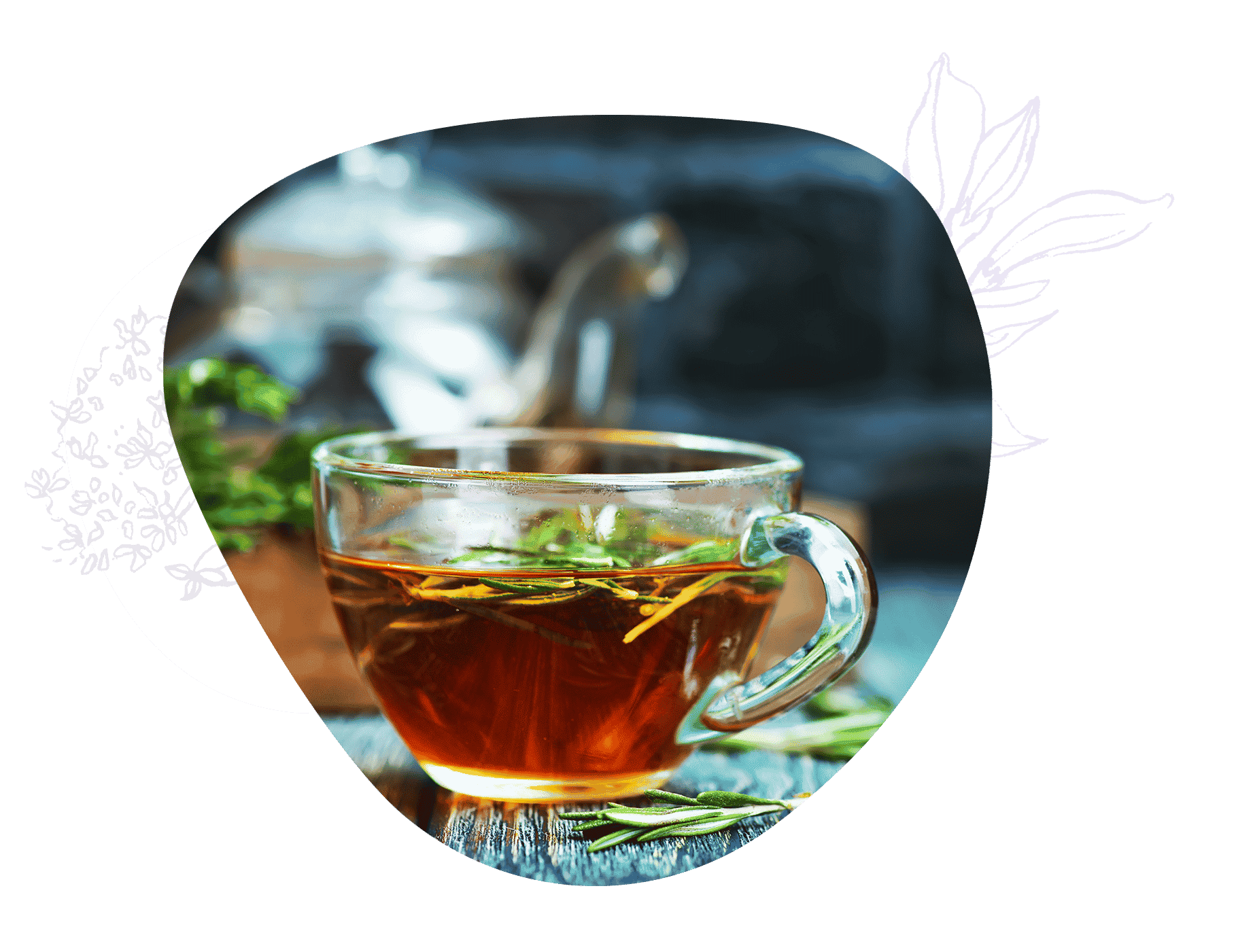
Menotest
menoelle®-menopause test
Am I already in the menopause or not yet?
Simply answer the 20 short questions in our menoelle® menopause test to know more straight away.

